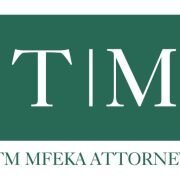Best Toxic Mold Lawyers in Pietermaritzburg
Share your needs with us, get contacted by law firms.
Free. Takes 2 min.
List of the best lawyers in Pietermaritzburg, South Africa
About Toxic Mold Law in Pietermaritzburg, South Africa
Toxic mold, typically referring to molds that produce mycotoxins, can have significant health impacts on individuals exposed to it. In Pietermaritzburg, this is particularly pertinent due to the region’s humid climate, which may foster mold growth under certain conditions. Legal issues regarding toxic mold often arise in the context of landlord-tenant disputes, property sales, and construction defect cases. Property owners and managers have a duty to ensure safe living conditions, free from hazardous mold, which can sometimes require legal expertise to address.
Why You May Need a Lawyer
If you are facing health issues or disputes about property conditions due to toxic mold exposure in Pietermaritzburg, legal assistance might be necessary. Common situations include rental properties where landlords are unresponsive to mold issues, real estate transactions where mold is discovered post-purchase, or workplace environments where mold exposure affects your health and safety. A lawyer experienced in toxic mold cases can help navigate these complex issues, seek remediation, and pursue compensation or legal compliance from responsible parties.
Local Laws Overview
In South Africa, there is no specific legislation governing toxic mold. However, various laws and regulations cover property standards and tenant rights, which can be applied to mold cases. The Rental Housing Act is relevant for landlord-tenant relationships, ensuring habitable living conditions. The Occupational Health and Safety Act mandates safe working environments, which can be invoked in cases of workplace mold exposure. Additionally, common law regarding negligence and breach of contract can also apply in situations where mold leads to property damage or health issues.
Frequently Asked Questions
What are common symptoms associated with toxic mold exposure?
Toxic mold exposure can cause respiratory issues, sinus infections, headaches, fatigue, and in some severe cases, neurological problems. Individuals with allergies or compromised immune systems might experience more acute symptoms.
How do I know if I have toxic mold in my home?
Signs of toxic mold include visible mold growth, a musty odor, or unexplained health symptoms among occupants. Professional inspections can confirm the presence of mold and identify the specific type.
What should tenants do if they suspect toxic mold in their rental property?
Tenants should report mold concerns to their landlord or property manager in writing. If the issue isn’t resolved, tenants may need to consult a lawyer to explore further options, including legal action.
Can I break my lease if there is toxic mold in my rented accommodation?
If toxic mold makes a property uninhabitable and your landlord fails to remedy the situation, you may have grounds to break your lease. Legal advice can help determine the best course of action.
Are landlords legally required to remove mold?
Landlords are generally obligated to maintain habitable conditions in rental properties, which includes addressing and remediating mold issues. Failure to do so can lead to legal liabilities.
What legal remedies are available if I've suffered from mold exposure?
Possible remedies include seeking damages for health consequences, remediation costs, and potentially breaking a lease if the mold presence in a rental property is pervasive.
How can I prove that mold has caused my health issues?
Medical documentation linking your symptoms to mold exposure is crucial. Environmental health experts may also provide evidence of toxic mold in your living or work environment.
Is mold testing necessary before pursuing a legal claim?
While not always legally required, mold testing can provide critical evidence in a legal claim. It helps establish the presence, type, and extent of mold, supporting your case.
Who is responsible for mold in a newly purchased home?
If mold is found after the purchase of a home, liability may depend on disclosure agreements or inspection findings that were available before the sale. Legal advice is often needed to ascertain liability.
Can insurance cover mold damage or remediation?
Mold coverage varies greatly between insurance policies. Review your policy details to determine if mold damage or remediation is covered and consult your insurer or a legal professional for clarification.
Additional Resources
For further guidance, individuals can reach out to the South African Human Rights Commission, local health departments, or the South African Department of Labour for related inquiries and assistance. Environmental health organizations and legal aid services may also provide valuable support for those dealing with toxic mold issues.
Next Steps
If you need legal assistance regarding toxic mold in Pietermaritzburg, it's advisable to contact a lawyer specializing in property or environmental law. Compile all related documentation, including any communications with landlords, medical records, and inspection reports, to ensure your lawyer can assess the situation effectively. Legal consultations can help you understand your rights, potential recourse, and next steps in resolving your toxic mold concerns.
Lawzana helps you find the best lawyers and law firms in Pietermaritzburg through a curated and pre-screened list of qualified legal professionals. Our platform offers rankings and detailed profiles of attorneys and law firms, allowing you to compare based on practice areas, including Toxic Mold, experience, and client feedback.
Each profile includes a description of the firm's areas of practice, client reviews, team members and partners, year of establishment, spoken languages, office locations, contact information, social media presence, and any published articles or resources. Most firms on our platform speak English and are experienced in both local and international legal matters.
Get a quote from top-rated law firms in Pietermaritzburg, South Africa — quickly, securely, and without unnecessary hassle.
Disclaimer:
The information provided on this page is for general informational purposes only and does not constitute legal advice. While we strive to ensure the accuracy and relevance of the content, legal information may change over time, and interpretations of the law can vary. You should always consult with a qualified legal professional for advice specific to your situation.
We disclaim all liability for actions taken or not taken based on the content of this page. If you believe any information is incorrect or outdated, please contact us, and we will review and update it where appropriate.










